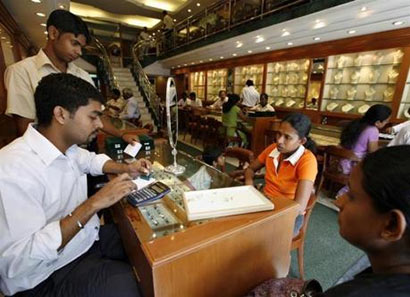Sri Lanka axes 100 pct surcharge that has halted all gold imports

(Reuters) – Sri Lanka scrapped a 100 percent surcharge on gold imports and cut import duty with immediate effect, officials said on Friday, after measures imposed in mid-2013 to curb purchases of the metal from abroad halted them completely in the third quarter.
Apart from removing the customs surcharge, the government cut import duty to 7.5 percent from 10 percent, partly to help the island’s struggling jewellery industry, officials said.
Sri Lanka placed a 10 percent duty on gold imports in June to discourage traders who were buying it abroad then smuggling it from Sri Lanka to top gold consumer India, where prices for the metal were higher. It later followed up with the 100 percent surcharge.
It was responding to a 47.1 percent year-on-year jump in gold imports to $200.2 million in the first half of 2013 and the measures proved extremely effective – central bank data shows there were no imports of the precious metal in the third quarter.
“The duty and surcharge were temporary, in line with neighbouring country policy action, to deal with the surge in gold prices and outflows,” P.B. Jayasundera, the secretary to the finance ministry and treasury told Reuters, referring to India’s own measures to tackle the problem.
The surcharge and higher duty were adopted partly because gold had assumed such a large role in bank lending that it exposed the country’s banking industry to excessive risk.
Sri Lanka last year saw a surge in gold pawning, a popular method of borrowing against the metal, and commercial banks’ exposure to this grew 20 percent year-on-year to around 339.4 billion rupees in 2012. It amounted to about 14.4 percent of the year’s total loans, central bank data showed.
A sudden fall in the price of gold in the middle of this year exposed Sri Lanka’s banking industry to the risk of a rise in non performing loans (NPL) associated with pawning, a Standard and Poors’ report said in August.
“A 7.5 percent duty is reasonable, given gold prices are getting stabilised. Banks should do better as losses will be less,” Jayasundera said.
Nandalal Weerasinghe, one of the central bank’s deputy governors, told Reuters the duty reduction was “mainly to support local jewellery industry.”
“Since banks have already taken measures to minimise the impact, we don’t see any issues with banks now,” he said.
Sri Lanka’s customs service said on Thursday it had revised the rules for the amount of gold that can be worn by local people leaving the country, after 56 Sri Lankans were arrested for gold smuggling in India.
Customs spokesman Leslie Gamini said women would be allowed to wear a maximum of the equivalent of 15 gold sovereigns, of about 7.98 grams each, while men and minors would be allowed five sovereigns, and all should return to the country with the same amount of gold.
The value of gold imports in the first nine months of this year rose 27 percent from $157.6 million in the same period last year.
Gold imports sank to $170 million in 2012, from a record $604 million in 2011, after the central bank twice tightened monetary policy and adopted a flexible exchange rate.
(Reuters)
Latest Headlines in Sri Lanka
- Sri Lanka disburses Rs. 50,000 relief to 70% of Cyclone Ditwah victims January 31, 2026
- Sri Lanka to launch national review on social media’s impact on children January 30, 2026
- Sri Lanka, Saudi Arabia move to boost industrial cooperation January 30, 2026
- Johnston Fernando, two sons and others further remanded until February 13, 2026 January 30, 2026
- Sri Lanka raises daily wage of plantation workers to Rs. 1,750 January 30, 2026


